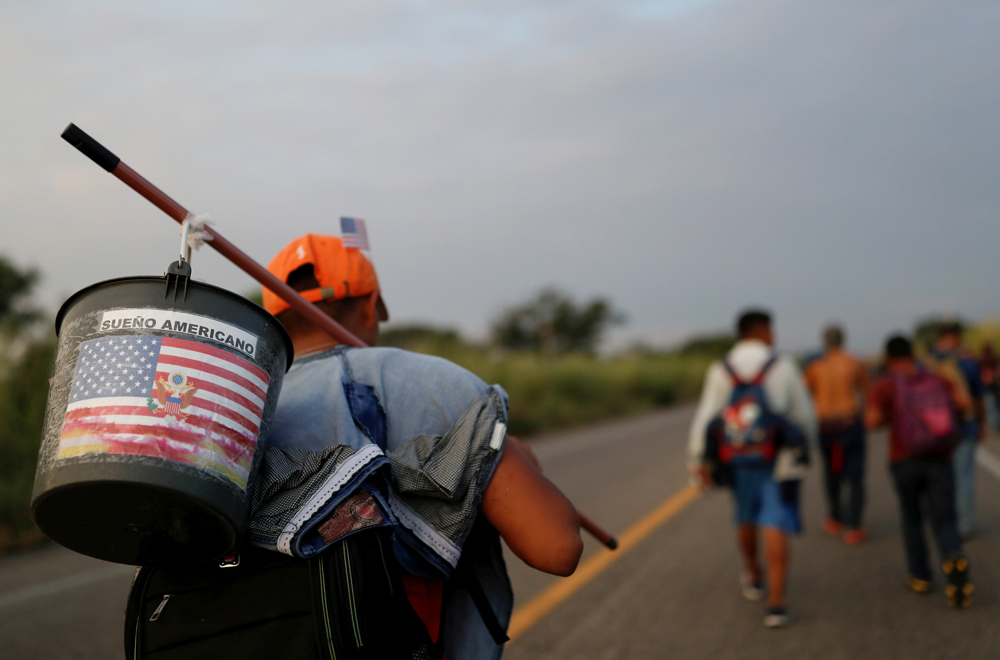
Mynor Gutierrez, a migrant from Guatemala who is part of a caravan traveling to the United States, carries a bucket decorated with a U.S. flag and a text that reads "American Dream," while he walks with fellow migrants along a road in Tapanatepec, Mexico. (CNS/Carlos Garcia Rawlins, Reuters)
Editor's note: Executive editor Tom Roberts aims to help readers understand how recent news stories fit together. NCR Connections will provide guideposts and markers to help lead readers through key issues and stories. See previous posts here.
Two situations in the nation's capital raise serious questions at the intersection of religion and commerce. The first involves the intended sale of two rent-controlled apartment buildings, part of a real estate portfolio, bequeathed in 2016 to the National Shrine of the Immaculate Conception. What's a basilica to do with unwanted property?
The intent to sell, and apparently eager buyers exist for properties in the gentrifying neighborhood. But what about tenants, some just hanging on in a region starved for affordable housing, who would have to find new housing? Is it just? Discussions continue, but Julie Bourbon explores the thorny matter from all sides.
The second story involves the sale of a prominent hospital, part of a major Catholic hospital network where executives pull down multimillion-dollar salaries and bonuses, that is the only facility left in the eastern portion of Washington serving the poor.
Discussions continue around that issue, too, and we'll post a story detailing the situation and the latest developments on Monday.
While multiple measures exist for calculating the toll of the clergy sex abuse scandal — numbers of perpetrators, numbers of victims, billions spent on settlements, number of hierarchs sidelined — it is quite another matter to quantify how disruptive the issue has been to life in the church. A headline on the NCR website this week tells a lot: "Abuse discussion may overshadow racism letter at US bishops' fall meeting ."
On exactly what axis the meeting spins — the abuse crisis or a letter on racism that's been in the works for nearly three years — may depend on what groups apply the most pressure. The buzz ahead of time is that the bishops may attract an array of interest groups unhappy with the bishops' positions on one issue or another.
Another way of putting the conundrum would be to say that the nagging, self-inflicted wound of the abuse scandal will keep the bishops focused on their own pain and unable to fully attend to the injustice and pain woven into the fabric of American culture, from before the republic even existed, and that continues insidiously to this day.
The saddest realization in all of this is that a voice of moral authority is more needed than ever, as the worst instincts of the wider culture are increasingly on display and appear to have tacit approval from a president who seemingly can't see the difference between white supremacists and those protesting racism, and who spins outrageous falsehoods about desperate migrants seeking asylum.
We hope the letter doesn't get overshadowed, and there's one more bright note in the story by national correspondent Heidi Schlumpf, previewing the gathering: The bishops will hold a voice vote on the cause for canonization for Sr. Thea Bowman, Sister of the Third Order of St. Francis of Perpetual Adoration, who was an eloquent voice for African-American Catholics. For a profile of Sister Thea, see here: "Good news for one another: The legacy of Sr. Thea Bowman" at Global Sisters Report.
And then there's this, heading into the meeting: Cardinal Daniel DiNardo of Galveston-Houston, president of the U.S. bishops' conference, was bishop of the Diocese of Sioux City, Iowa, during a period that the diocese recently admitted it had hidden the identity of a priest who admitted being a serial sexual predator of young boys. What did DiNardo know? When did he know it? And will the story figure into the discussion in Baltimore? We asked. No one has yet responded.u78
Advertisement
NCR is often at its best when it's gets under the skin of a story that's in the news, particularly when the story involves human rights and people on the margins. Such is the case with the migrant caravan traveling from Honduras.
"People aren't leaving here because they want to," Fr. Daniel St. Laurent, a priest from the Diocese of Manchester, New Hampshire, told Maria Benevento, a Bertelsen intern taking a deeper look than most at the reality of the caravan heading toward the U.S. border. Spoiler alert: It's not an invasion. Laurent, who serves the chaplain at the Juticalpa Campus of the Catholic University of Honduras, continued, "Nobody wants to leave their homeland. Nobody wants to leave their culture. Nobody wants to leave their family. It's something they're forced to do."
[Tom Roberts is NCR executive editor.]





